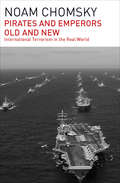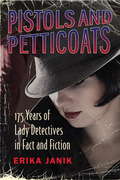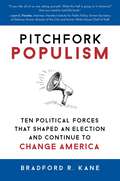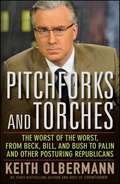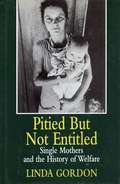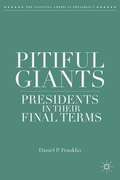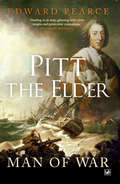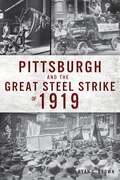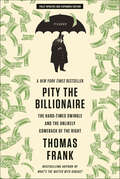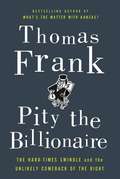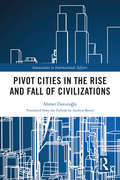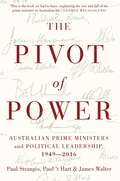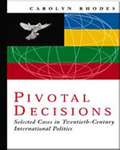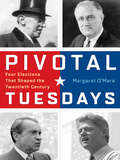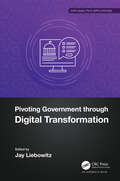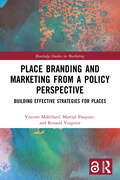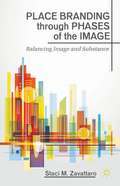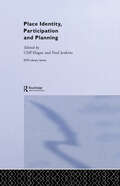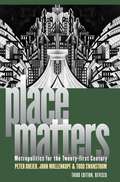- Table View
- List View
Pirates and Emperors, Old and New: International Terrorism in the Real World (Chomsky Perspectives Ser.)
by Noam ChomskyOne of the world&’s leading intellectuals &“raises provocative questions about U.S. diplomacy&” in a brilliant account of the workings of state terrorism (Maclean&’s). Pirates and Emperors, Old and New is a virtuoso exploration of the role of the United States in the Middle East that exposes how the media manipulates public opinion about what constitutes &“terrorism.&” Chomsky masterfully argues that appreciating the differences between state terror and nongovernmental terror is crucial to stopping terrorism and understanding why atrocities like the bombing of the World Trade Center and the killing of the Charlie Hebdo journalists happen. &“Disturbing reading and as always, indispensable.&” ―The Ubyssey Praise for Noam Chomsky &“Our greatest unraveller of accredited lies.&” —New Statesman &“Chomsky is a global phenomenon . . . perhaps the most widely read voice on foreign policy on the planet.&” —The New York Times Book Review &“There is no living political writer who has more radically changed how more people think in more parts of the world about political issues.&” ―Glenn Greenwald, journalist and author &“A truth-teller on an epic scale. I salute him.&” —John Pilger, journalist, writer, and filmmaker
Pirates, Terrorists, and Warlords: The History, Influence, and Future of Armed Groups Around the World
by Jeffrey H. NorwitzPirates, warlords, guerillas, criminal organizations, drug cartels, apocalyptic religious extremists, police agencies, terrorists: these are classic insurgents whose past, present, and future is dissected in this important book. Contributing writers including Martha Crenshaw, T. X. Hammes, Russell Howard, Gene Cristy, Yosef Kuperwasser, and academics from Naval War College, Marine Corps War College, and Stanford University, explore important insurgency-related issues such as domestic terrorism, globalization of armed groups, children on the battlefield, religious influence on armed fights, and more. This rich anthology offers scholars and citizens a new way to think about national and international security-as it stands today, and its future.
Pissing in a River: A Novel
by Lorrie Sprecher&“An honest and genuine DIY punk-rock lesbian love story.&” —Kirkus Reviews Amanda moves to London with nothing but her guitar and her collection of punk music as the soundtrack to her every move. With the company of a few friendly voices in her head, she looks for—and finds—a best friend and new lover. She forms a band, Lesbian Raincoat, and completely rewrites the story of her life. In this irreverently funny yet profound novel, Amanda risks deportation, recalls the fervor of AIDS activism in the United States, connects to the class struggle of punk, and finds redemption in love. But she also must confront her own mental illness, her lover&’s rape, and the violence of post-9/11 politics. Pissing in a River captures the glee and turbulence of surviving the cacophony of modern life. &“A love letter to the obsessions that captivated an outcast generation: punk, politics, passion, and provocation.&” —Maria Raha, author of Cinderella&’s Big Score: Women of the Punk and Indie Underground
Pistols and Petticoats: 175 Years of Lady Detectives in Fact and Fiction
by Erika JanikA lively exploration of the struggles faced by women in law enforcement and mystery fiction for the past 175 yearsIn 1910, Alice Wells took the oath to join the all-male Los Angeles Police Department. She wore no uniform, carried no weapon, and kept her badge stuffed in her pocketbook. She wasn't the first or only policewoman, but she became the movement's most visible voice.Police work from its very beginning was considered a male domain, far too dangerous and rough for a respectable woman to even contemplate doing, much less take on as a profession. A policewoman worked outside the home, walking dangerous city streets late at night to confront burglars, drunks, scam artists, and prostitutes. To solve crimes, she observed, collected evidence, and used reason and logic--traits typically associated with men. And most controversially of all, she had a purpose separate from her husband, children, and home. Women who donned the badge faced harassment and discrimination. It would take more than seventy years for women to enter the force as full-fledged officers.Yet within the covers of popular fiction, women not only wrote mysteries but also created female characters that handily solved crimes. Smart, independent, and courageous, these nineteenth- and early twentieth-century female sleuths (including a healthy number created by male writers) set the stage for Agatha Christie's Miss Marple, Sara Paretsky's V. I. Warshawski, Patricia Cornwell's Kay Scarpetta, and Sue Grafton's Kinsey Millhone, as well as TV detectives such as Prime Suspect's Jane Tennison and Law and Order's Olivia Benson. The authors were not amateurs dabbling in detection but professional writers who helped define the genre and competed with men, often to greater success.Pistols and Petticoats tells the story of women's very early place in crime fiction and their public crusade to transform policing. Whether real or fictional, investigating women were nearly always at odds with society. Most women refused to let that stop them, paving the way to a modern professional life for women on the force and in popular culture.
Pitchfork Populism: Ten Political Forces That Shaped an Election and Continue to Change America
by Bradford R. KaneA veteran political analyst examines the forces that led to the rise of the current form of populism and considers their continuing influence on the future of American politics. What political, social, and cultural forces led to the election of President Donald Trump? Political analyst Bradford R. Kane explores ten dynamics of American politics and society that played a role in the 2016 presidential election and continue to exert an influence on current politics. The author examines both the present impact of the Trump presidency and the future trajectories of the trends that brought Trump to power. Some of these dynamics have deep historical roots, such as the cultural divide between those who define our national identity in terms of rugged individualism versus those who emphasize community collectivism. The author notes that these opposing viewpoints helped craft our national identity as far back as the 1700s. He also considers the effect of changing demographics, such as the trend that points to the emergence of a new majority composed of combined minority groups, which will have a profound effect on community relations and politics. Kane foresees a return to established policy processes and governing principles after the Trump presidency, as opposed to rule based on the president's personal interests. He anticipates greater empowerment of the electorate as more demographic groups are increasingly enfranchised. Kane also forecasts the potential impact of recent developments on the 2020 election and beyond. Other topics discussed are the role of the media, accountability, globalization, the future of bipartisanship, and more. This astute analysis by a veteran government insider will help Americans understand recent events and provides a roadmap for navigating the future political landscape.
Pitchforks and Torches: The Worst of the Worst, From Beck, Bill, and Bush to Palin and Other Posturing Republicans
by Keith OlbermannAn irresistible new collection from the New York Times bestselling author and host of MSNBC's Countdown with Keith Olbermann. In his particular wit and style, Keith Olbermann skewers politicians, celebrities, and people behaving badly every weeknight on MSNBC's increasingly popular Countdown with Keith Olbermann. This book starts right after President Obama's election and collects all of Olbermann's acclaimed "Special Comments," a few of his "Quick Comments," all but one of his feature "WTF," selections of "Bushed" and "Still Bushed," and, of course, a healthy dose of "The Worst Person in the World." Covers everything from gay marriage to Sarah Palin, John Edwards' love child, and the Bush legacy--plus Sean Hannity, Glenn Beck, and, of course, Bill-O. Olbermann is a frequent poster to the popular website DailyKos, where his audience has shown itself as fervid and highly supportive. New from the New York Times bestselling author of The Worst Person of the World and Truth and Consequences Showcasing Olbermann at his most controversial, outspoken, and entertaining, Keith Olbermann's Hall of Shame cuts to the truth in a world of lies.
Pitied But Not Entitled: Single Mothers and the History of Welfare, 1890-1935
by Linda GordonWhen Americans denounce "welfare", most are thinking of the program of aid for single mothers and their children--the only program of the Social Security Act to become stigmatized. In this book, Gordon uncovers the tangled roots of competing visions of welfare and shows that welfare reform can only work if it recognizes that single motherhood is an enduring aspect of contemporary life.
Pitiful Giants
by Daniel P. FranklinSince ratification of the 22nd Amendment in 1951, five American presidents Eisenhower, Reagan, Clinton, Bush, and Obama have been elected to serve a second term. Presumably, by virtue of their term-limited status, these presidents are free from electoral pressure to pursue policies in the public interest, but this is a questionable assumption. Second term presidents face a host of structural obstacles that make it difficult for them to carry out their tasks. How then do presidents lead through these politically-complex circumstances? How can presidents make the most of their second-tem "mandates" while battling against waning political power? This book seeks to answer the complex and often paradoxical challenges presidents encounter in their lame duck years. "
Pitt the Elder: Man of War
by Edward PearceThis remarkable book opens at the dawn of the British Empire - with the great sea battle at Quiberon Bay where French ships, intended for the 1759 invasion of Britain, are chased, caught and defeated by a fleet commanded by Admiral Sir Edward Hawke. In this momentous victory Britain effectively settled the outcome of the Seven Years' War and established itself as the world's dominant imperial power.At the heart of the conflict with France was William Pitt, the first Earl of Chatham and Britain's future Prime Minister. Weaving together military history and political biography Edward Pearce provides a portrait of the man 'with an eye like a diamond' - a man who had close ties with the slave trade and who preached war and British supremacy on a world stage. Alongside detailed descriptions of battles in Europe and North America we follow Pitt's career as a politician - one that was closely intertwined with General James Wolfe at Quebec; American independence; the slow mind of George III and the quick one of the rake and outsider John Wilkes.Edward Pearce scrutinises the real man at the heart of the historical events and mystique surrounding the legacy of Pitt the Elder, to present a rounded and masterful portrait of arguably the most powerful minister ever to guide Britain's foreign policy and of an age which marked a new epoch in history, when the balance of power in Europe and the world was set for almost two centuries.
Pittsburgh and the Great Steel Strike of 1919
by Ryan C. BrownAuthor Ryan C. Brown details the harrowing days of the Great Steel Strike of 1919 that rocked Pittsburgh and its seemingly impregnable "principality of steel."In 1919, the steel industry of Pittsburgh was on the brink of war. Years of labor strife broke out into open conflict as steel workers launched the biggest strike to date in the United States, paralyzing mills from Youngstown to Johnstown and beyond. Radical unionists, anarchists and Bolshevik sympathizers set bombs, planned for revolution and fought police in violent battles. As the postwar Red Scare began to sweep the nation, federal agents used the strikes as an excuse to comb Pittsburgh's immigrant neighborhoods looking for communists.
Pity the Billionaire: The Hard-Times Swindle and the Unlikely Comeback of the Right
by Thomas FrankNew York Times Bestseller: A “witty and highly readable” account of the wildly unexpected cultural and political reactions to the Great Recession (Financial Times).From the author of What’s the Matter with Kansas?, this is an updated and expanded edition of “a brilliant expose of the most breathtaking ruse in American political history: how the Right turned the biggest capitalist breakdown since 1929 into an opportunity for themselves” (Barbara Ehrenreich, author of Nickel and Dimed).Economic catastrophe usually brings social protest and demands for change—or at least it’s supposed to. But when Thomas Frank set out in 2009 to look for expressions of American discontent, all he could find were loud demands that the economic system be made even harsher on the recession’s victims and that society’s traditional winners receive even grander prizes.The American Right, which had seemed moribund after the 2008 election, was strangely reinvigorated by the arrival of hard times. The Tea Party movement insisted not that we question the failed system but that we reaffirm our commitment to it. Republicans in Congress embarked on a bold strategy of total opposition to the liberal state. And TV phenom Glenn Beck demonstrated the commercial potential of heroic paranoia and the purest libertarian economics.In Pity the Billionaire, Frank examines the peculiar mechanism by which dire economic circumstances delivered unexpected political results. Using firsthand reporting, he gives us the first full diagnosis of the cultural malady that has transformed collapse into profit, reconceived the Founding Fathers as heroes from an Ayn Rand novel, and enlisted the powerless in a fan club for the prosperous.“Tom Frank, as ever, makes some wickedly clever observations and produces some surprising answers.” —Vanity Fair“This is the kind of analysis—historically astute, irreverent and droll—that makes Frank such an invaluable voice.” —San Francisco Chronicle“His eye for detail and his ability to capture a scene reminded me of reading zoologist Dian Fossey on a group of strange political primates.” —The Washington Post
Pity the Billionaire: The Hard-Times Swindle and the Unlikely Comeback of the Right, 1st edition
by Thomas FrankFrom the bestselling author of What’s the Matter with Kansas?, this witty and highly provocative book asks a simple question: How is it possible that the disastrous collapse of the free market economy in 2008 could have heralded a popular revival—of the right? In Pity the Billionaire, a brilliant, funny, and disturbing tour de force, Thomas Frank analyzes the sleight of hand involved in the right’s resurgence—all the upside-down grievances that have transformed economic suffering into valentines for the rich and powerful. This great chronicler of American paradox dissects the contradictions at the heart of the country’s politics, and in this “dazzling” book once again shows himself as "one of the best left-wing writers America has produced" (The Guardian).
Pivot Cities in the Rise and Fall of Civilizations (Innovations in International Affairs)
by Ahmet DavutoğluBased on the author’s long experience in academic life and the public realm, especially in foreign policy, this book argues that a single categoric classification of cities is inadequate, and that cities have had different and varied impacts and positions throughout the history of civilization. The author examines how the formation, transformation, destruction or reestablishment of many civilizational cities reveals a clearer picture of the cornerstones of the course of human history. These cities, which play a decisive and pivotal role in the direction of the flow of history as well as providing us with a compass to guide our efforts to understand and interpret this flow, are conceptualized by the author as civilizations’ "pivot cities". This innovative book explores the role of great cities in political historical change, presenting an alternative view of these pivot cities from a culturalist perspective. Within this framework, the role played by pivot cities in the history of civilization may be considered under seven distinct headings: pioneering cities which founded civilizations; cities which were founded by civilizations; cities which were transplanted during the formation of civilizations; "ghost cities" which lost their importance through shifts in political power and civilizational transformation; "lost cities" which were destroyed by civilizations; cities on lines of geocultural/geoeconomic interaction; and cities which combine, transform or are transformed by different civilizations. The author’s concept of pivot cities explores the interplay between vital cities and civilizations, which bears on the future of globalization at a time of instability, as projected continuing de-Westernization becomes a theme in studies of global history. This book provides highly productive discussions relevant to the literature on city-civilization relationships and the historicity of pivot cities. Its clear language, rich content, deep and original perspective, interdisciplinary approach and rich bibliography will ensure that it appeals to students and scholars in a variety of disciplines, including cultural studies, political science, comparative urban studies, anthropology, history and civilizational studies.
Pivot of Power: Australian Prime Ministers and Political Leadership, 1949-2016
by Paul 't Hart James Walter Paul StrangioThe prime ministership remains the main prize in Australian politics, but it is a precarious one. Leadership turnover in recent years has seen more prime ministers rise and fall than at any time since the decade after federation. What explains this volatility? The Pivot of Power is the second volume in a unique blend of collective biography and institutional history that shows the skills, limitations and passions of incumbents are only part of the story. The ways in which prime ministers thrive and fail are influenced by the resources at their command, the evolving nature of the parties they lead, the daunting public expectations they face under a relentless media gaze, and the challenges that history throws at them. Recent changes in these areas have had a destabilising effect and made the role of prime minister more onerous than ever. After decades of strong national leadership, the office has rarely seemed quite so confounding as it does for its contemporary holders. The Pivot of Power explains how this has come about. And its rich account of prime-ministerial fortune since the mid-twentieth century yields historical lessons for overcoming the current malaise.
Pivotal Decade: How the United States Traded Factories for Finance in the Seventies
by Judith SteinIn this fascinating new history, Judith Stein argues that in order to understand our current economic crisis we need to look back to the 1970s and the end of the age of the factory--the era of postwar liberalism, created by the New Deal, whose practices, high wages, and regulated capital produced both robust economic growth and greater income equality. When high oil prices and economic competition from Japan and Germany battered the American economy, new policies--both international and domestic--became necessary. But war was waged against inflation, rather than against unemployment, and the government promoted a balanced budget instead of growth. This, says Stein, marked the beginning of the age of finance and subsequent deregulation, free trade, low taxation, and weak unions that has fostered inequality and now the worst recession in sixty years. Drawing on extensive archival research and covering the economic, intellectual, political, and labor history of the decade, Stein provides a wealth of information on the 1970s. She also shows that to restore prosperity today, America needs a new model: more factories and fewer financial houses.
Pivotal Decisions: Select Cases in Twentieth Century International Politics
by Carolyn RhodesThis brief, accessible set of ten case studies includes a chronological range of "pivotal decisions" which have directly affected the course of international politics at the global level. These key historical cases, which have come to be regarded as crucial to our collective understanding of international relations since World War I, provide an important context within which to analyze relations among nations.
Pivotal Tuesdays
by Margaret O'MaraSerious and silly, unifying and polarizing, presidential elections have become events that Americans love and hate. Today's elections cost billions of dollars and consume the nation's attention for months, filling television airwaves and online media with endless advertising and political punditry, often heated, vitriolic, and petty. Yet presidential elections also provoke and inspire mass engagement of ordinary citizens in the political system. No matter how frustrated or disinterested voters might be about politics and government, every four years, on the first Tuesday in November, the attention of the nation--and the world--focuses on the candidates, the contest, and the issues. The partisan election process has been a way for a messy, jumbled, raucous nation to come together as a slightly-more-perfect union.Pivotal Tuesdays looks back at four pivotal presidential elections of the past 100 years to show how they shaped the twentieth century. During the rowdy, four-way race in 1912 between Teddy Roosevelt, William Howard Taft, Eugene Debs, and Woodrow Wilson, the candidates grappled with the tremendous changes of industrial capitalism and how best to respond to them. In 1932, Franklin Roosevelt's promises to give Americans a "New Deal" to combat the Great Depression helped him beat the beleaguered incumbent, Herbert Hoover. The dramatic and tragic campaign of 1968 that saw the election of Richard Nixon reflected an America divided by race, region, and war and set in motion political dynamics that persisted into the book's final story--the three-way race that led to Bill Clinton's 1992 victory.Exploring the personalities, critical moments, and surprises of these races, Margaret O'Mara shows how and why candidates won or lost and examines the effects these campaigns had on the presidencies that followed. But this isn't just a book about politics. It is about the evolution of a nation and the history made by ordinary people who cast their ballots.
Pivoting Government through Digital Transformation (Data Analytics Applications)
by Jay LiebowitzAffecting every sector and country in the world, digital technology is changing the way citizens engage in society, companies conduct business, and governments deliver public services. The COVID-19 pandemic accelerated the pace of digitalization and exposed such vulnerabilities as inadequate infrastructure, weak regulations, and a scarcity of skilled professionals capable of digitally transforming government. Not immune to the digital revolution, governments are slowly adapting to a digital world. Governments are implementing digital solutions to deliver services to their citizens, make payments, and engage the public. Focusing on how government can transition more effectively through digital transformation, Pivoting Government Through Digital Transformation covers the following key components: Setting the stage during the Great Resignation period Filling the digital talent pipeline Best practices and vignettes for applying digital transformation in government Looking ahead towards the future Key chapter contributors from U.S. and foreign governments, as well as state and local governments, discuss how they are coping with today’s environment and how they are using digital transformation efforts to enhance their organization’s effectiveness and digital talent pipeline. With chapters on theory and practice, this groundbreaking book offers an in-depth analysis of the most innovative approaches to e-government and discusses case studies from local, state, and federal government perspectives. This is an essential guide for government employees, scholars, and regular citizens who want to make government work more effectively and democratically in the digital age.
Pizarro, el rey de la baraja.: Análisis de su sistema de acción política
by Alan GarcíaUna lección de política a través del estudio de uno de los principales conquistadores de América: Francisco Pizarro.Francisco Pizarro es una figura extensamente estudiada por historiadores, escritores y autores de las más diversas orientaciones, quienes durante casi 500 años se han preguntado cómo un aventurero español, a la cabeza de un reducido ejército, logró conquistar el Imperio Inca. En este libro, sin embargo, el ex presidente peruano Alan García desarrolla un análisis novedoso, desde un ángulo muy pocas veces abordado: Pizarro como personaje político. García explora de forma rigurosa los hechos históricos y extrae de ellos las reglas o normas políticas que guiaron los actos de Pizarro hacia el éxito en la conquista de unos de los mayores imperios de la América prehispánica.Pizarro no fue un ajedrecista al modo de Napoleón, pero fue un espléndido jugador de naipes. A partir de este hecho, Alan García elabora una comparación metafórica entre la política y el juego de cartas, para analizar el papel que el azar y el cálculo juegan en cada caso. Tal y como sucede en la baraja que, en principio, está regida por la suerte o la providencia, también las acciones de Pizarro estaban condicionadas por un contexto específico poco favorable; sin embargo, es ahí donde interviene la astucia del conquistador y del jugador de naipes: cuando vence la adversidad con inteligencia y construye infinitas posibilidades.Pizarro, el Rey de la Baraja, combina el análisis y conocimiento detallado de la historia con la agilidad de la prosa. Y más allá de su carácter histórico, nos brinda una comprensión de la política y el liderazgo, válida para los tiempos actuales.
Piñera
by Bernardita Del Solar Loreto DazaSebastián Piñera Echenique, Presidente número 38 de la historia republicana de Chile, empresario exitoso y multimillonario, se ha pasado la vida compitiendo. Si algo lo motiva en el mundo es la idea de ganar. Por el placer de vencer, por la adrenalina de medirse contra otros. Ganar en rendimiento académico, ganar en los negocios, ganar en política. El afán por sobresalir, la valoración de la inteligencia, el pragmatismo y su deseo de ser el primero en todo, junto con la lealtad hacia su familia y amigos, así como una opción política en la que antepone las libertades a las convenciones, son todas cualidades que se formaron en un hogar con un padre culto y excéntrico, y una madre de voluntad férrea para la cual Sebastián Piñera era su «Chatito de Oro». Esta biografía repasa todos los entretelones importantes de la vida de Sebastián Piñera y desgrana los sucesos más polémicos en los que se ha visto envuelto: el Banco de Talca, el Caso Chispas y el «Piñeragate». Pero más allá, la ingente investigación que se han propuesto las autoras con más de noventa entrevistas a familiares, amigos y enemigos, ministros de Estado y hasta el propio Presidente, dan vida a un libro excepcional por su profundidad, su narrativa y por la luz que arroja a una época y a un personaje fascinante.
Place Branding and Marketing from a Policy Perspective: Building Effective Strategies for Places (Routledge Studies in Marketing)
by Martial Pasquier Vincent Mabillard Renaud VuignierAs part of an emerging literature on place branding, this book fills the important gap between practice-oriented literature—which lacks in-depth and critical analysis—and technical academic literature—which tends to miss down-to-earth practitioners' concerns and to overlook policy and political contexts. Providing frameworks and knowledge on how to practice place branding effectively, this book anchors place-branding practices in a solid analytical framework. It presents place-branding practices through the lenses of public sector marketing, strategic management, and governance processes and structures, as well as communication tools. Marketing a place is more than creating a logo and a motto; this book presents the key strategic aspects to be considered when promoting a place. Readers will gain knowledge about the most important features of place promotion: the development of brands and marketing campaigns in the public sector, the establishment of dedicated politico-administrative structures, and the increasing involvement of various stakeholders that play a central role as place promoters. This book will be a valuable resource for researchers and postgraduate students across place branding, marketing and management, and urban studies, as well as public management, administration, and policy. The practical conclusions discussed in the book will also appeal to practitioners, business consultants, and people working in public administration and politics.
Place Branding through Phases of the Image
by Staci M. ZavattaroAs places face increased competition for human and capital resources, public managers turn toward corporate-like governance strategies and branding practices to shape places and organizations. However, for better or worse, these organizations begin to resemble highly competitive, private-sector public relations and marketing firms. Place branding is taking hold within many organizations, including city governments, yet very few scholars take a public administration approach when exploring the causes and effects of branding practices. In Place Branding through Phases of the Image, Zavattaro explains how city promotional strategies can take the place of corporate governance structures through phases of the image. She examines how city government entities are undertaking place branding practices, with the realization that relying too much on image rather than a balance between image and substance has serious implications for democratic, collaborative governance. This book creates a workable framework that simultaneously serves as a cautionary tale for building a promotional campaign focused exclusively on image.
Place Identity, Participation and Planning (RTPI Library Series #Vol. 7)
by Paul Jenkins Cliff HagueThe central concern of this book is place identity, and its representation and manipulation through planning. Place identity is of growing international concern, both in planning practice and in academic work. The issue is important to practitioners because of the impact of globalisation on notions of place. This book includes comparisons between Norway, the Netherlands, Sweden and Scotland, focusing strongly on the question of how different spatial planning systems and practices are currently conceiving and affecting issues of place identity.
Place Matters: Metropolitics For The Twenty-first Century
by Peter Dreier John Mollenkopf Todd SwanstromHow can the United States create the political will to address our major urban problems--poverty, unemployment, crime, traffic congestion, toxic pollution, education, energy consumption, and housing, among others? That's the basic question addressed by the new edition of this award-winning book. Thoroughly revised and updated for its third edition, Place Matters examines the major trends and problems shaping our cities and suburbs, explores a range of policy solutions to address them, and looks closely at the potential political coalitions needed to put the country's "urban crisis" back on the public agenda. The problem of rising inequality is at the center of Place Matters. During the past several decades, the standard of living for the American middle class has stagnated, the number of poor people has reached its highest level since the 1960s, and the super-rich have dramatically increased their share of the nation's wealth and income. At the same time, Americans have grown further apart in terms of where they live, work, and play. This trend--economic segregation--no longer simply reflects the racial segregation between white suburbs and minority cities. In cities and suburbs alike, poor, middle class, and wealthy Americans now live in separate geographic spaces. The authors have updated the case studies and examples used to illustrate the book's key themes, incorporated the latest Census data, and drawn on exit polls and other data to examine the voting patterns and outcomes of the 2012 elections. They have expanded their discussion of how American cities are influenced by and influence global economic and social forces and how American cities compare with their counterparts in other parts of the world. And they draw upon the latest research and case studies not only to examine the negative impacts of income inequality and economic segregation, but also assess the efforts that civic and community groups, unions, business, and government are making to tackle them. Fully up to date and far richer and more provocative, this new version surpasses its previous editions and will continue to be an essential volume for all who study urban politics and care about our cities.
Place Naming, Identities and Geography: Critical Perspectives in a Globalizing and Standardizing World (Key Challenges in Geography)
by Gerry O’ReillyThis book presents research on geographical naming on land and sea from a wide range of standpoints on: theory and concepts, case studies and education. Space and place naming or toponymy has a long tradition in the sciences and a renewed critical interest in geography and allied disciplines including the humanities. Place: location and cartographical aspects, etymology and geo-histories so salient in past studies, are now being enhanced from a range of radical perspectives, especially in a globalizing, standardizing world with Googlization and the consequent ‘normalization’ of place names, perceptions and images worldwide including those for marketing purposes. Nonetheless, there are conflicting and contesting voices. The interdisciplinary research is enhanced with authors from regional, national and international toponymy-related institutions and organizations including the UNGEGN, IGU, ICA and so forth.
